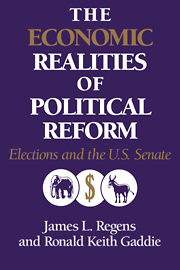Book contents
- Frontmatter
- Contents
- List of tables and figures
- Acknowledgments
- Abbreviations
- Introduction
- 1 The Senate in transition and campaign finance
- 2 Early money and profit taking in Senate campaigns
- 3 Targeting rent provision by major interests
- 4 Sitting in the cheap seats?
- 5 Implications for campaign-finance reform
- 6 Reform and the rent-seeking legislature
- Notes
- Bibliography
- Index
3 - Targeting rent provision by major interests
Published online by Cambridge University Press: 18 December 2009
- Frontmatter
- Contents
- List of tables and figures
- Acknowledgments
- Abbreviations
- Introduction
- 1 The Senate in transition and campaign finance
- 2 Early money and profit taking in Senate campaigns
- 3 Targeting rent provision by major interests
- 4 Sitting in the cheap seats?
- 5 Implications for campaign-finance reform
- 6 Reform and the rent-seeking legislature
- Notes
- Bibliography
- Index
Summary
A landed interest, a manufacturing interest, a mercantile interest, a moneyed interest, with many lesser interests, [which] grow up of necessity in civilized nations and divide them into different classes, actuated by different sentiments and views.
James Madison Federalist, Number 10The previous chapter demonstrated the encroachment of rent-seeking behavior throughout the Senate term and identified indicators of efficiency in rent seeking by Senators. In this chapter, we analyze the allocations of economic interests to incumbent Senators through political-action-committee (PAC) contributions. In particular, we are concerned with identifying the sources from which Senators obtain their rents and identifying the criteria by which PACs allocate campaign contributions as variable benefits.
Rent provision by economic interests
In order to examine the subtleties of the relationships between legislators and organized interests in the context of rent seeking, it is important to delineate the constraints and facilities that will affect a legislator's ability to garner rents. Presumably, organized interests seek the lowest-cost, highest-yield providers of policy options. The degree to which a legislator can provide sufficient policy to an interest at a competitive price with other members of the policy oligopoly will dictate the amount of rents the legislator will obtain in the aggregate. Therefore, member attributes that affect the costs of providing different types of policy should influence the decision by cash-providing interests to provide substantial rents to that member.
Targeting rent provision by major interests
Other factors impact on the ability of legislators to provide policy outputs to benefit-seeking interests.
- Type
- Chapter
- Information
- The Economic Realities of Political ReformElections and the US Senate, pp. 56 - 71Publisher: Cambridge University PressPrint publication year: 1995



